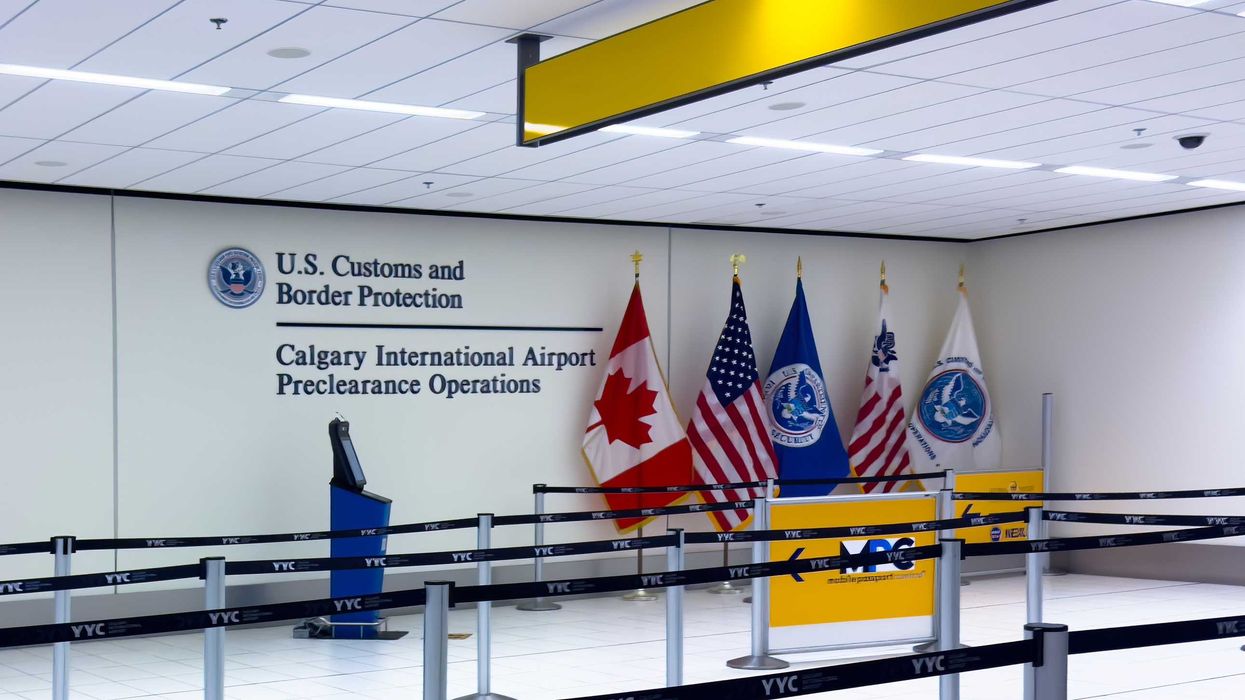Some Canadians travelling to the US now have to pay a new $350 'integrity fee'
A family of four could now owe over $2,400 — just to enter the country. 🫣

A new U.S. "visa integrity fee" just kicked in, and some travellers from Canada are impacted.
If you're planning a trip to the United States, heads up — Canada-U.S. travel just got a lot more expensive for some.
A new U.S. travel visa rule came into effect this week, and it could cost some Canadians an extra $350 before even leaving the country.
The change comes from the U.S. government's One Big Beautiful Bill Act, passed in July, which introduces a new "visa integrity fee" for certain travellers.
As of October 1 — the start of the new fiscal year — the fee is officially in effect and could apply to anyone applying for a U.S. travel visa, including some Canadian citizens and permanent residents.
What is the U.S. visa integrity fee?
The integrity fee is a charge of US$250 — or about CA$350 — that applies to anyone issued a non-immigrant visa to the U.S. It's added on top of existing visa application fees, which already start at US$185 (CA$260) for most travellers.
That means a family of four applying for tourist visas could now be paying around CA$2,400 in total visa costs just to cross the border — and that's before booking flights or accommodation.
The fee is not optional and cannot be waived under any circumstances. It's also subject to increase each year based on inflation, starting in 2026.
The purported idea is to deter people from overstaying their visas or breaking the rules of their stay. Theoretically, travellers who follow all the rules and leave on time could qualify for a reimbursement — but that's far from guaranteed.
Who has to pay?
Not all Canadian travellers will be affected. Most Canadian citizens visiting for tourism, shopping or short-term business don't need a visa at all — so this new U.S. travel rule won't change anything for them.
However, Canadian citizens do need a non-immigrant visa for certain travel reasons, such as:
- Joining a U.S. fiancé(e) (K-1 and K-2 visas)
- Completing a family immigration process (K-3 and K-4)
- Working as treaty traders or investors (E-1 and E-2)
- Serving as diplomatic or international officials (A, G, NATO)
- Assisting in law enforcement operations (S-5, S-6, S-7)
Canadian permanent residents, however, are among the most impacted. Unlike citizens, most permanent residents must always obtain a non-immigrant visa to enter the U.S., even for short visits — and that now comes with the integrity fee attached.
Is the fee refundable?
Technically, yes — but it's complicated. According to the U.S. law, the integrity fee "may" be reimbursed, but only if the traveller follows all visa rules exactly and leaves the U.S. within five days of their visa expiring (or secures an extension or green card before then).
The catch? There's no official refund process in place right now, and since many non-immigrant visas are valid for up to 10 years, it could take a decade to even qualify for reimbursement.
An estimate from the nonpartisan U.S. Congressional Budget Office (CBO) published in May predicts that only a small fraction of visa holders will actually ever see reimbursement.
In its cost analysis, the CBO notes that "a large number of nonimmigrants would not be eligible to seek reimbursement until several years after paying the fee," and that "the Department of State would need several years to implement a process for providing reimbursements."
Because of the long validity of many visas and the time it will take to build a refund system, the office projects the integrity fee will generate about $28.9 billion over the next decade in revenue from fees paid that are never reimbursed to travellers.
Here's what travellers need to know
- If you're a Canadian citizen planning a regular vacation, you're probably in the clear.
- If you're a permanent resident of Canada, or heading to the U.S. for work, school or family reasons, you might need a visa — and that now means paying the integrity fee.
- The fee is per person, so families and groups will be paying multiple times.
- There’s no clear refund process, and even if one is established soon, it could take years to get your money back.
Anyone travelling to the U.S. from Canada in the coming months should check the latest U.S. travel advice from Canadian officials and be sure they understand what visa they need — and how much it's going to cost them.
AI tools may have been used to support the creation or distribution of this content; however, it has been carefully edited and fact-checked by a member of Narcity's Editorial team. For more information on our use of AI, please visit our Editorial Standards page.
- Canada-US travel advice keeps changing — Here are all the latest rules & ominous warnings ›
- A Canadian citizen has died in ICE custody in Florida ›
- Canada's US travel advisory was just updated with a warning for LGBTQ+ travellers ›
- Canada was just voted one of the best countries by Americans — and the feeling isn't mutual - Narcity ›
- Canada has some surprisingly intense warnings for American travellers over the holidays - Narcity ›
- Canadians travelling to the US will soon be photographed every time they cross the border - Narcity ›
- Officials just issued new travel advice for all Canadians going abroad this winter - Narcity ›
- Some travellers from Canada to the US could soon have to share 5 years of social media history - Narcity ›